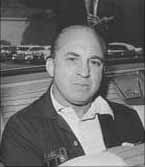The Arrogance of Power (36 page)
Read The Arrogance of Power Online
Authors: Anthony Summers

_____
Soon after Watergate, Charles Colson ran into former Kennedy aide Kenneth O'Donnell at an airport. “How did you ever stand working for Nixon?” O'Donnell asked. “JFK never trusted his mental ability.” According to former
Washington Post
editor Benjamin Bradlee, Kennedy came to regard Nixon as “sick,” “mentally unsound.” Less harshly, he said he thought his former opponent “did not know who he was.”
Kennedy's comments had probably been based on more than just personal observation, for Nixon's use of the New York psychotherapist Dr. Hutschnecker had come close to exposure in 1960. Joseph Kennedy told a female friend that his people had “a whole dossier” on the matter. Frank Sinatra, who was in touch with Kennedy Sr. and campaigning for his son, tried to get publicity for a private investigator's report revealing that Nixon was Hutschnecker's patient. Gossip columnist Walter Winchell ran veiled references to that effect. Two days before the election, sitting at home with his wife, the doctor took a call from an Associated Press reporter wanting to know if Nixon was “in good health.” Hutschnecker fended him off.
Those who watched Nixon that year worried about his ability to cope with pressure. “It was this lack of an over-all structure of thought, of a personal vision of the world that a major statesman must possess,” wrote Theodore White, “that explained so many of those instances of the campaign when he broke under pressure.” “The presidency, of course,” Nixon's own mother said, “is such a great responsibility that I often wonder whether any man could survive under the pressure of that office. I have, however, faith in Richard. . . .”
Nixon found the day of Kennedy's inauguration, in January 1961, “one of the most trying days in my life.” He sat through his former opponent's speech, then went home. That night, knowing that he had the use of his official limousine for only a few more hours, he asked his driver to take him on a last tour around Washington. Nixon no longer had a Secret Service escort. When he tried to enter his Senate office, to take a last look out the window at the view down the Mall, he found it locked. The prestige and power of the vice presidency, such as it was, were already passing.
“I opened a door,” Nixon remembered, “and went out onto the balcony that looks out across the west grounds of the Capitol. . . . It never seemed more beautiful than at this moment. The Washington Monument stood out stark and clear against the luminous gray sky, and in the distance I could see the Lincoln Memorial. . . . I thought about the great experiences of the past fourteen years. Now all that was over. . . .”
Then he was driven home through the snow-shrouded streets, clogged with traffic taking guests to inaugural balls celebrating another man's victory, the victory Nixon believed should have been his.
On the last day of the contest, aboard his campaign plane, John Kennedy had been asked by a journalist how he expected he would cope were he to lose. “I'll tell you one thing,” he had replied, “I won't take it nearly as hard as Nixon will.” Because Nixon did not have much “inner resource,” Kennedy thought, it would be a “terrible blow.”
Even before the campaign started, a more sympathetic observer had weighed the same prospect. “Suppose he misses it,” Whittaker Chambers had written in a letter to a friend. “I cannot imagine what such a defeat will do to him.”
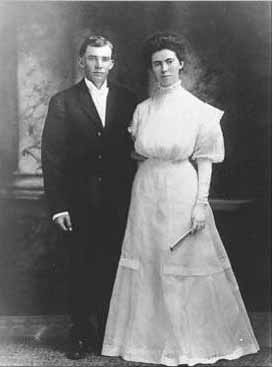
1.
Nixon's father Frank and his mother Hannah, on their wedding day in 1908. Richard described her as a “saint.”
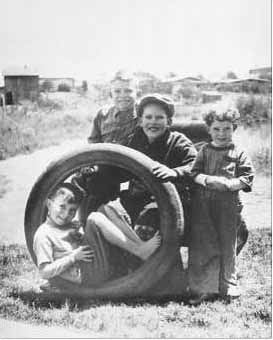
2.
Richard, age nine,
(standing at left)
at play with three of his four brothersâtwo were to die young.
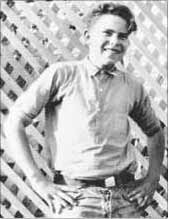
3.
Richard was a star student at school and at college, and later when he studied at Duke University.
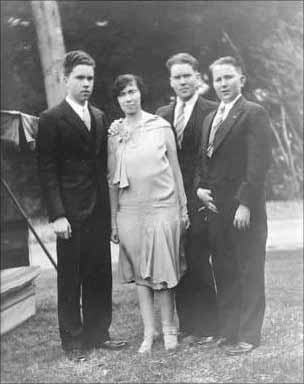
4.
Richard
(left)
with his mother and brothers Harold and Donald. Of the latter, only Donald was to survive.
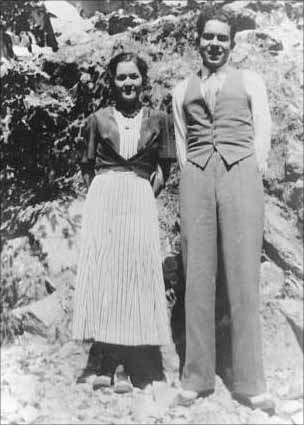
5.
With his first love, Ola Welchâshe left him to marry another man.
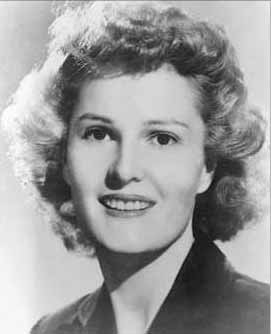
6.
Pat Ryan, soon after her 1940 marriage to Nixonâ theirs would be a rocky relationship.
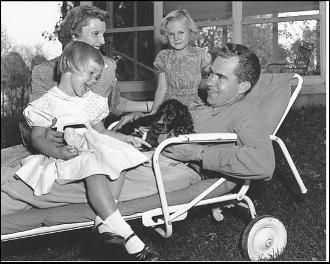
7.
A First Family-to-be. Nixon with Pat and their two daughters, Tricia
(right)
and Julie
(left),
in the early days in Washington.
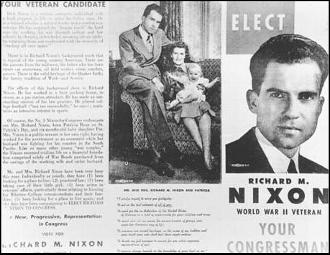
8.
The campaign propaganda that helped win the first election.
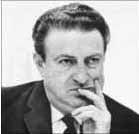
9.
Murray Chotiner
(left),
Nixon's election strategistâhis guiding principle was “hit 'em, hit 'em, hit 'em again.”
